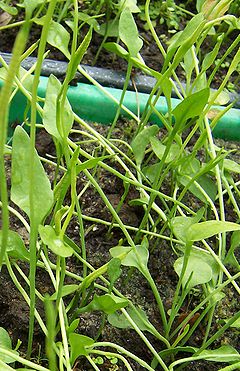- Ophioglossum lusitanicum
-
Ophioglossum lusitanicum 
Ophioglossum lusitanicum Scientific classification Kingdom: Plantae Division: Pteridophyta Class: Psilotopsida Order: Ophioglossales Family: Ophioglossaceae Genus: Ophioglossum Species: O. lusitanicum Binomial name Ophioglossum lusitanicum
L.Synonyms Ophioglossum coriaceum A. Cunn
Ophioglossum gramineum Willd.
Ophioglossum vulgatum subsp. lusitanicum
Ophioglossum vulgatum var. lusitanicum
Ophioglossum lusitanicum (Least Adder's Tongue) is a small fern of the family Ophioglossaceae. It is categorised as Vulnerable by the IUCN (2001).[1]
Contents
Description
This small winter annual fern consists of a simple sterile blade attached to a spike-like fertile blade with between three and eight sunken sporangia on either side. The whole plant rarely exceeds a height of 2 cm.[2]
This species has a chromosome number of 2n= 250-260 [2]
Distribution
O. lusitanicum is native to the western seaboard of Europe (Great Britain, Spain and Portugal), the Atlantic Islands (Cape Verde and the Canary Islands), the Middle East (Israel and Iran[3]), South America (Peru and Argentina) , and Australasia (Australia and New Zealand).[4]
The distribution in Britain is restricted to one small area of coastal heath on St Agnes, Isles of Scilly. It grows in short turf on Wingletang Downs where some colonies are suffering from an increase of competitive grasses, gorse (Ulex europaeus) and bramble (Rubus fruticosus).[5] O. lusitanicum is listed on Schedule 8 of the Wildlife and Countryside Act, 1981 and is within a Site of Special Scientific Interest (SSSI).
In Australasia and South America this species is represented by subspecies coriaceum (A. Cunn.) R.T. Clausen [6][7]
Ecology
As this species is a winter annual it requires a warm winter environment. In its British populations it favours thin, unshaded, peaty soils in south facing localities.[8]
Subspecies coriaceum has a much broader ecological range in southern Australia where habitats it frequents include meadows, woods and heathland.[9]
References
- ^ [1] Plant Network datasheet on Ophioglossum lusitanicum
- ^ a b Stace C. (1997). New Flora of The British Isles, second edition. Cambridge: Cambridge University Press
- ^ [2] Naqinezhad, AR & Kavousi, K. (2004) The easternmost distribution of Ophioglossum lusitanicum L., new to flora of Iran. –Iran Journ. Bot. 10 (2): 167-171.
- ^ [3] Ophioglossum lusitanicum at: Encyclopedia of Life
- ^ Bennallick, I.J., French, C.F and Parslow, R.E. (2009) Vascular Plants. In CISFBR, Red Data Book for Cornwall and the Isles of Scilly. 2nd Edition. Praze-an-Beeble: Croceago Press.
- ^ [4] Ophioglossum lusitanicum subsp. coriaceum at: The Plant List
- ^ [5] Ophioglossum coriaceum at: NZ Plant Conservation Network
- ^ [6] Ophioglossum lusitanicum at Online Atlas of the British Flora
- ^ [7] Ophioglossum lusitanicum at: Ferns of New South Wales
External links
Categories:- Ophioglossaceae
- Fern species
- Environment of the Isles of Scilly
Wikimedia Foundation. 2010.
